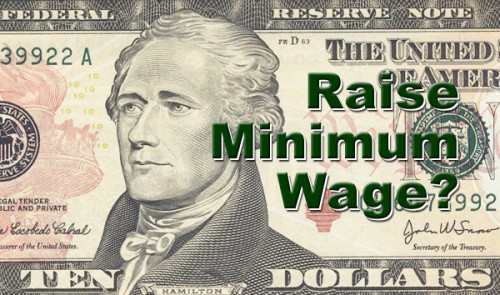Minimum wage debate is in full swing again after President Obama desperately trying to save his approval rating – with the exception of Nixon, worse than any other postwar second-term president – urged Congress to raise its federal level to $9 / hour. Daily show joined the bandwagon with their typical charade, and even managed to embarrass an otherwise indestructible Peter Schiff in the process.
You don’t need to have a Ph.D. in economics to understand the consequences of introducing, or raising, minimum wage (actually you might need not to hold a Ph.D. to be able to use common sense, instead of making up arguments fitting the narrative of those who are paying you). When an employee is not productive enough to be paid the mandated minimum, he is not worth being kept on your payroll. One visit to Australia’s supermarket full of automated cashier machines will tell the story of those whom they replaced and who are now contributing to 5.8% of unemployed Aussies.
Of course, the logical question should be why increase it only to $9, why not $20, $50, or $100? I’m sure food chains’ staff wouldn’t mind making $200k a year and if a $1.75/hour increase does not hurt the employment, why should $92.75 do the job? It’s difficult to show the consequences of raising the minimum wage, precisely because its proponents are usually smart enough not to do it in too big increments. It is true that a slight minimum wage hike doesn’t usually increase unemployment immediately. But since it increases some employers’ expenditures, it necessarily cuts back their plans to hire more workers who are just joining the workforce (typically graduates with lower education) or invest capital to increase productivity, which would lead to higher wages in the long run. What’s worse, it makes it impossible for the disadvantaged to compete with price – think the long-term unemployed, alcoholics, drug addicts or criminals trying to get their lives together, but posing a risk which needs to be accounted for to their potential employers.
Minimum wage hurts all these vulnerable groups the most and it’s no coincidence that some of its biggest proponents are those with Harvard degrees, who would never even have to consider getting an under-minimum-wage job, or those representing the existing workforce (labor union leaders). Motives for such proposals are questionable and can range from simple cluelessness, through protecting your union members against cheaper competition, to hiding your own policy failures.
What’s there to hide? Well, for example, the fact that five states with the lowest unemployment rate in the US are those which kept minimum wage at the federal level, while those with the highest unemployment rate have increased it beyond $7.25, and an increase of federal mandate above all of them would level the field for some time. Or that France, constantly pushing for EU-level minimum wage, has an unemployment rate which is more than double compared to neighboring Germany, with no such mandated minimum, and that the only country in the EU with lower rate is Austria, with the minimum wage of zero. Hong Kong, a country with a similar level of economic freedom to Singapore has almost double the rate of unemployment compared to the island city state. Guess which of them has minimum wage and which one doesn’t. And it’s not only about unemployment. Try to get a good cheap meal in Hong Kong for $4.
No one is saying it’s good for anyone to work for a salary lower than what is a typical minimum wage in most countries. The problem with minimum wage is that it takes a chance to those who end up below it to increase their productivity by training, practice and getting access to better machinery while hurting everyone else with higher prices for services.



















No comments
Be the first one to leave a comment.